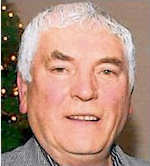
ABOVE: Thomas McGuinn
This blog previously reported on the indictment of three Irish residents — Tom McGuinn, his son Sean McGuinn, and Sean Byrne — and their company Mac Aviation for exports of helicopter engines from the United States to Iran. The defendants allegedly had the engines shipped from the United States to Mac Aviation in Ireland and then re-exported them to Iran.
Now comes news of a superseding indictment in that case with new charges against the defendants. Most significantly, the superseding indictment now alleges that the defendants bought F-5 canopy panels in the United States and then exported them to Iran. Based on these allegations, the superseding indictment adds for the first time counts for violating the Arms Export Control Act.
The significance here is that these charges may make it easier to extradite the defendants from Ireland because these exports violate current U.N. sanctions and would (at least presumably) violate Irish law, whereas the helicopter engine exports likely were legal under Irish law. The only problem here is that the F-5 canopy panel exports occurred in 2005. This was before U.N Security Council Resolution 1747 which imposed the international arms embargo on Iran in 2007.
The story told by the superseding indictment about how McGuinn and company got the canopy panels out of the U.S. is both interesting and a little unclear. McGuinn allegedly purchased the panels from a California company and told the company that the panels were going to the Nigerian Air Force. The California company naturally refused to sell the panels to McGuinn without an export license authorizing the panels to go to Nigeria. McGuinn then, according to the indictment, asked the California company to ship the panels to a representative of McGuinn’s freight forwarder in the United States, something the California company also declined to do without an export license. (Obviously, the California company had undergone good compliance training on export red flags!)
Now comes the interesting part. According to the indictment:
[D]efendant MAC AVIATION caused a representative of ABL freight, located in Compton, California, to remove all attached invoices from [the California company] from the F-5 forward canopy panels, and replace them with a Packing List and Proforma Invoice on defendant MAC AVIATION letterhead addressed to “Microset Systems Sdn Bhd,†Free Commercial Zone, Southern Zone, Kuala Lumpur, Malaysia for three (3) Plastic Panels, Part Number 3-13204-01, Serial Numbers 2146, 2149, and 2150.
The packages were then shipped by ABL to Malaysia and, thereafter, McGuinn allegedly had them shipped on to Tehran.
It’s not clear who ABL is. Probably they are the California company’s freight forwarder. How MacGuinn got ABL to change the packing information and then ship the panels is even more unclear, although if that happened, my guess would be that some improper financial incentives to some ABL employee was involved. The panels had either been consigned to an ABL facility pending the licenses or the ABL employee had access to the California company’s parts warehouse. This part of the export scenario, if true, would also increase the likelihood of extradition from Ireland by strengthening the claims of U.S. jurisdiction over McGuinn who, it would appear, engaged in substantial activities in the United States in order to avoid the U.S. requirement for an export license.
 Permalink
Permalink
Copyright © 2010 Clif Burns. All Rights Reserved.
(No republication, syndication or use permitted without my consent.)

 Posted by
Posted by  Category:
Category: 

